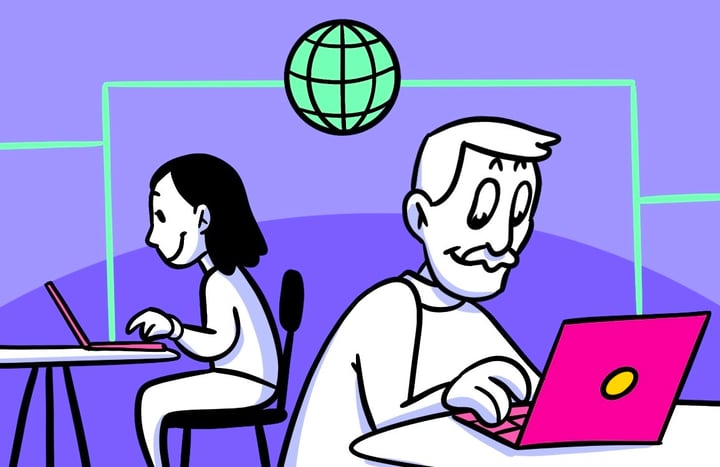The Law of Past Experience: Shaping Personal and Choices
you ready to learn about the fascinating world of decision-making? Great! In this article, we’re going to dive deep into the Law of Past Experience and how it influences the choices we make. So, without further ado, let’s get started!
🔩 The Nuts and Bolts:
- The Law of Past Experience shapes how we interpret new situations. Our brains rely on past encounters to form a mental framework that influences the choices we make in similar scenarios.
- Our past experiences can both guide and limit decision-making. While they offer a sense of comfort and familiarity, relying too much on past outcomes can prevent us from exploring new possibilities.
- Memory retrieval plays a crucial role in decision-making. Not all memories are equally accessible, and vivid or emotionally charged experiences tend to influence our choices more than others.
- Past experiences significantly impact personal life decisions. Choices about relationships, living environments, and even life partners are often shaped by what we’ve learned and felt in the past.
- Professional choices are influenced by past achievements and failures. Career decisions often stem from previous success or negative work environments, guiding future paths and values.
- Overcoming the Law of Past Experience requires broadening perspectives. Engaging with diverse experiences and staying present in the moment can help break the cycle of making decisions solely based on past encounters.
Defining the Law of Past Experience
Before we delve into the nitty-gritty details, let’s take a moment to understand what the Law of Past Experience is all about. Simply put, this law states that our past experiences play a crucial role in shaping our decision-making process. It’s like having a mental archive of all the situations we’ve encountered, and our minds draw upon these experiences when faced with new choices.
But what is the psychological basis behind this law? Let’s find out.
The Psychological Basis of the Law
At the heart of the Law of Past Experience lies the concept of cognitive psychology – the study of how our minds process information. Our brains are wired to recognize patterns and make associations based on previous encounters. This innate ability enables us to navigate our way through life and make decisions based on what we have learned.
Essentially, our past experiences serve as a mental framework that guides our thought processes. It’s like having a built-in autopilot system for decision-making!
Key Principles of the Law of Past Experience
Now that we know the psychological basis behind the law, let’s explore some key principles that shape the way it operates. First and foremost, the law holds that our past experiences heavily influence our perception of current situations. This means that two individuals with different backgrounds may interpret the same scenario in entirely different ways.
Furthermore, the law suggests that our past experiences bias our decision-making process. We tend to lean towards choices that have proven successful in the past, even if there might be better alternatives. This can sometimes lead to a sense of comfort and familiarity, but it may also restrict our ability to explore new possibilities.
Another important principle of the Law of Past Experience is the concept of memory retrieval. When faced with a decision, our brains retrieve relevant memories from our mental archive. However, it’s important to note that not all memories are equally accessible. Some experiences may be more vivid and easily retrievable, while others may be buried deep in our subconscious.
Moreover, the law highlights the role of emotions in the decision-making process. Our past experiences are often associated with certain emotions, and these emotions can influence our choices. For example, if we had a negative experience in the past, we may be more hesitant to make a similar choice in the present, even if it logically seems like the right decision.
Make your design decisions count.
Subscribe to Design Under Pressure. Get insights, UX metrics, and tools for bold, informed design.
We respect your inbox. Just insights. No fluff. Privacy Policy.
The Role of Past Experience in Decision-Making
Now that we have a solid grasp of how the law works, let’s delve into how past experiences affect the decision-making process.
Understanding the intricate relationship between past experiences and decision-making is crucial in comprehending the complexities of human behavior. Our brains are wired to not only process information logically but also to draw upon past encounters to guide our choices.
The Cognitive Process of Decision-Making
When faced with a decision, our minds go through a series of cognitive processes. We gather information, assess the options, and weigh the potential outcomes. But here’s where past experiences kick in. Our minds automatically search for similar situations from the past to provide a reference point.
These references help us evaluate the potential risks and rewards of our choices. If a similar decision yielded positive outcomes in the past, we’re more likely to lean towards that option. On the other hand, negative experiences may deter us from making similar choices.
Moreover, the cognitive process of decision-making is not solely based on rationality; emotions also play a significant role. Past experiences intertwined with emotions can heavily influence our decisions, sometimes leading us to make choices that defy logical reasoning.
The Influence of Past Experiences on Choices
Our past experiences have the power to shape not only our perception but also the choices we make. Let’s say you had a bad experience with a particular brand of electronics. The next time you’re looking to make a similar purchase, you might subconsciously steer clear of that brand. Our past encounters mold our preferences and influence our decision-making, sometimes without us even realizing it!
Furthermore, the impact of past experiences on decision-making extends beyond individual choices. In a broader context, societal norms, cultural upbringing, and historical events collectively shape the decision-making processes of entire communities. The collective past experiences of a group can influence their choices in politics, economics, and social interactions, illustrating the profound effect of history on decision-making at large.
Body copy
Laws of UX
The Impact of Past Experience on Personal and Professional Decisions
Past experiences don’t just affect our day-to-day decisions; they also play a significant role in shaping our personal and professional lives. Let’s explore how this manifests in both areas.
Personal Life Decisions and Past Experiences
When making important personal life decisions, such as choosing a life partner or deciding where to live, our past experiences heavily influence our thought processes. Our memories of previous relationships, places we’ve lived, and even childhood experiences create a mental database that informs our choices.
For example, if you grew up in a close-knit community, you might gravitate towards living in a similar setting as an adult. The sense of belonging and familiarity that you experienced in your childhood can shape your desire for a similar environment in your adult life. On the other hand, if you had a nomadic upbringing, constantly moving from one place to another, you might seek stability and a sense of rootedness in your choice of residence.
Moreover, past romantic experiences also influence our personal life decisions. If you’ve had negative romantic experiences in the past, such as heartbreak or betrayal, you might approach new relationships with caution. These experiences teach us valuable lessons about trust, communication, and compatibility, which we carry forward into future relationships. Conversely, positive experiences can give us the confidence to pursue new connections and take risks in matters of the heart.
Professional Choices Influenced by Past Experiences
Similarly, when it comes to professional decisions, our past experiences come into play. The knowledge and skills we’ve acquired throughout our careers form the foundation upon which we build our future choices. Our achievements, failures, and even workplace interactions all influence the trajectories we choose to pursue.
For instance, if you’ve achieved success in a particular field, you’re more likely to lean towards similar career paths. The sense of fulfillment and accomplishment you experienced in your past endeavors can serve as a driving force in your professional decision-making. On the other hand, negative experiences might steer you away from certain industries. If you’ve had a toxic work environment or felt unfulfilled in a specific role, you might actively seek opportunities in different sectors or pursue a career change altogether.
Furthermore, our past professional experiences shape not only our ambitions but also our work values and preferences. If you’ve had positive interactions with supportive colleagues and mentors, you might prioritize a collaborative work environment. On the contrary, if you’ve faced adversity or felt undervalued, you might prioritize autonomy and independence in your professional choices.
In conclusion, our past experiences have a profound impact on both our personal and professional decision-making processes. They shape our preferences, values, and perspectives, serving as guiding forces as we navigate through life. By acknowledging and understanding the influence of our past, we can make more informed choices and pave the way for a fulfilling future.
Overcoming the Limitations of the Law of Past Experience
While the Law of Past Experience can be a valuable tool in decision-making, it’s important to recognize its limitations. Here are a few strategies to broaden our perspectives and mitigate the potential pitfalls.
Strategies for Broadening Decision-Making Perspectives
One way to overcome the limitations of the law is to actively seek out different perspectives. Engaging in discussions with people from diverse backgrounds and varied experiences can provide fresh insights and challenge our preconceived notions.
Additionally, exposing ourselves to new experiences and stepping out of our comfort zones can help us expand our mental archives. Trying new activities, exploring different cultures, or learning new skills can provide us with a broader range of references to draw upon when making decisions.
The Importance of Present Moment Awareness in Decision-Making
Being mindful and present in the moment is another powerful tool for decision-making. By focusing on the current situation rather than solely relying on past experiences, we give ourselves the opportunity to evaluate each choice independently.
Practicing mindfulness allows us to tap into our intuition and make decisions that align with our current circumstances, rather than being solely guided by past patterns.
The Future of Decision-Making: Beyond the Law of Past Experience
As our understanding of human cognition evolves, new theories are emerging that challenge the dominance of the Law of Past Experience. Let’s take a sneak peek into what the future might hold for decision-making.
Emerging Theories in Decision-Making Psychology
Researchers are constantly uncovering fresh insights into the complexities of decision-making. One emerging theory suggests that our emotions and social influences play a more significant role than previously believed. This theory posits that our decisions are not solely based on past experiences, but also on our emotions and interactions with others.
The Role of Technology in Shaping Decision-Making Processes
Another avenue for future exploration is the impact of technology on decision-making. With the advent of artificial intelligence and machine learning, we’re entering an era where algorithms can process vast amounts of data to assist in making informed choices. The integration of technology into decision-making processes promises to revolutionize the way we approach decisions.
So, there you have it! A comprehensive overview of the Law of Past Experience and its impact on decision-making. As we’ve discovered, our past experiences are a powerful force that shapes the choices we make in both our personal and professional lives. While it’s essential to acknowledge the influence of the past, we should also explore ways to broaden our perspectives and embrace the possibilities of the future. Happy decision-making!
Law of Past Experience FAQs
The Law of Past Experience refers to the idea that our past experiences heavily influence our current decision-making. When faced with choices, our brains draw on memories and previous encounters to guide us toward decisions that align with what we have experienced before.
The law suggests that our decisions are shaped by how we’ve handled similar situations in the past. Our minds automatically retrieve relevant memories, and this mental framework often leads us to make familiar choices, which can sometimes limit our ability to explore new opportunities.
Our brains are wired to recognize patterns, and past experiences provide a mental shortcut for decision-making. We rely on these memories, especially those tied to strong emotions, as a reference to evaluate the risks and rewards of a current decision.
Emotions attached to past experiences play a powerful role in decision-making. Positive experiences encourage us to repeat similar choices, while negative experiences often cause us to avoid them, even if logic suggests a different course.
When making personal decisions, such as choosing a partner or where to live, past experiences play a critical role. We tend to lean toward environments or relationships that provide comfort or mirror our past, sometimes subconsciously shaping our preferences.
Yes, past professional experiences shape our career decisions. Success in a particular field may encourage continued pursuit, while negative experiences like toxic workplaces or job dissatisfaction may drive a person to explore other industries or roles.
To avoid the limitations of relying solely on past experiences, it’s essential to broaden your perspective. Seek out diverse experiences, expose yourself to new environments, and engage in mindfulness to focus on the present. This approach helps create more balanced decision-making.



